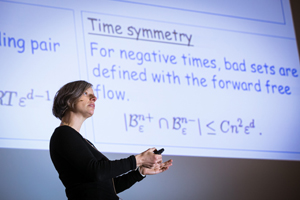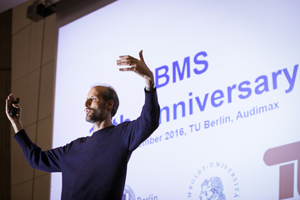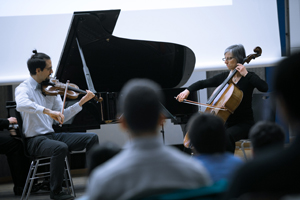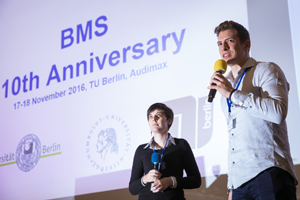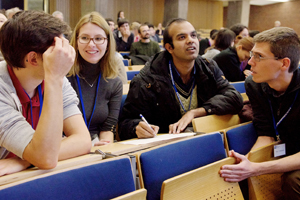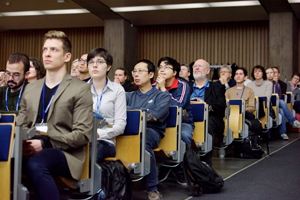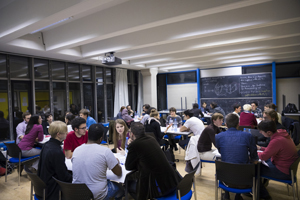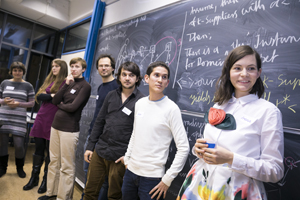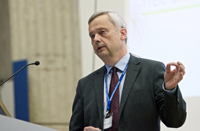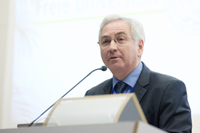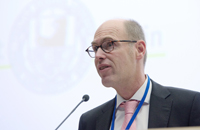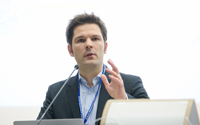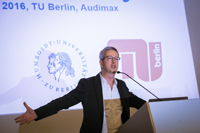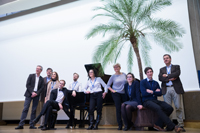
|

Sofía from Colombia

Martha from Uganda

Sophia from the US

Li Li from China

Dragana from Serbia

Alexander from the United Kingdom

Efstathia from Greece

Christoph from Germany

Ignacio from Chile

Todor from Bulgaria
First BMS - BGSMath Junior Meeting in BarcelonaIn their rich, diverse and international mathematical environments, the Berlin Mathematical School (BMS) and the Barcelona Graduate School of Mathematics (BGSMath) share the common goal of striving for excellence in their doctoral and postdoctoral training programs. To kick off the new collaboration between these two graduate schools, the first BMS - BGSMath Junior Meeting was held in Barcelona on 9 and 10 October 2017. The BMS and BGSMath have declared their intention to cooperate together in initiatives aimed at promoting the mobility of and exchange between students and faculty members by way of events such as the Junior Meeting; joint summer schools; mutual visits by advanced students and postdocs of each institution; and other scientific activities. The ultimate goal is to create strong scientific exchange, strengthen research collaboration between the respective math communities, and enhance the multicultural environment of both graduate schools.
Written by S. E. Sutherland-Figini Sources: BMS Phase II student’s 3D models are winners
Created using sturdy, metallic-looking paper, the cut-outs for the models can be produced in large numbers using a laser cutting technique. The models are then put together by the users themselves and depict mathematical geometries with so-called multiple coverings. These are geometric analogies to the weaving process used in the production of cloth. By introducing multi-coverings, the models become both more stable and mathematically interesting. The models presented depict platonic solids, double covered, but the method can be applied to any geometrical model. Potential customers for Double Cover’s winning idea include teachers, science workshop organizers and private individuals. The other team members are the former BMS vice chair and head of the Mathematical Geometry Processing group Prof. Dr. Konrad Polthier, technical staff member Ulrich Reitebuch and student assistant Kevin Guo. The “Research to Market Challenge” is a competition for research-based product and business ideas and is open to members or alumni of the FU Berlin, among others. As well as prize money in the sum of 1500 euros, the team has been offered the chance to take part in a one-day workshop on business model development, coaching on how to successfully present their idea, and personal feedback by experts. No sooner had Martin accepted this prize with his team on 18 July 2017, than he and some members of his research group were awarded with another prize! On 10 August 2017 in Tokyo, Japan, the winners of this year’s Asian Digital Modeling Contest (ADMC) were announced: Martin, Konrad, and Ulrich were jointly awarded one of the two ADMC2017 Awards for Excellence for their model “Chladni Towers”.
As a member of the Mathematical Geometry Processing group at the FU Berlin, Martin is currently working on his PhD under the supervision of the former BMS vice chair Prof. Dr. Konrad Polthier. Martin's research interests include the acquisition of point sets via 3D-scanning as well as their processing. With regards to efficiency, he is interested in nearest-neighbor algorithms and corresponding data structures. Many congratulations to Martin and the other members of his team for their success! Top rankings for Berlin universities in 2017According to the "Times Higher Education (THE) World University Rankings", the Humboldt-Universität zu Berlin (HU), the Freie Universität Berlin (FU) and the Technische Universität Berlin (TU) belong to the top seven universities in Germany. Ranked 4th, 5th and 7th, respectively, they each claim higher positions in comparison with the results of previous years. 20th BMS Kovalevskaya LunchE On 2 June 2017, the 20th BMS Kovalevskaya Lunch took place with Prof. Sujatha Ramdorai as the twentieth special guest invited to share her experience as a woman mathematician with twenty participants from the BMS. In celebration of this milestone, everyone in attendance was given a small gift from the BMS in the form of a USB stick. Sujatha Ramdorai is an algebraic number theorist and, over lunch at the Urania Berlin, she shared the story of her desire to study mathematics and outlined her career success to date, which includes being a member of the Scientific Advisory Council to the Prime Minister of India for a period of five years. The BMS Kovalevskaya Lunch, held once a semester since 2007, aims to give female students the opportunity to talk to an outstanding female mathematician and to exchange experiences as women in the field of mathematics. Previous Sonia Kovalevskaya Colloquium guest speakers can be found on this page of our website. The BMS is committed to providing an outstanding environment where women are able to thrive in mathematics. In 2016, the BMS student body was over 30% female, but the goal of the BMS is to achieve a 50% representation of women among its students. As well as the Kovalevskaya Lunch event, the BMS strives to provide positive role models for women via the BMS faculty and postdoc faculty members, BMS mentors, board members, guest speakers and visitors too. In addition, the BMS awards the Hilda Geiringer Scholarship to outstanding female PhD students in recognition of their achievements to date and to support their future mathematical research endeavours. Hilda Geiringer’s daughter, Magda Tisza, validated the efforts of the BMS in fostering women mathematicians with her comment: "The stellar record of some of your scholarship selections is impressive." BMS welcomes a student delegation from Atlanta
On Tuesday 23 May 2017, the BMS welcomed a delegation of 20 undergraduate students and three faculty members from Morehouse College and Spelman College, two American universities situated in Atlanta, Georgia. This event aimed to give the visiting students and faculty a chance to connect with their counterparts in Germany, and gain first-hand exposure to prospective careers and research opportunities in the field of mathematics. BMS Deputy Chair, Prof. Dr. John Sullivan, began by giving a presentation about the BMS, its PhD Program, and about the mathematics landscape in Berlin in general. This was followed by talks from three BMS Phase II students, who each presented their own research projects. Patrick Gelß, based at the FU, gave a talk on “The tensor-train format and its applications - Modeling and analysis of chemical reaction networks, catalytic processes, fluid flows, and Brownian dynamics”. Ana Djurdjevac, also based at the FU, presented her research on “Random PDEs on evolving hypersurfaces”. Finally, using material from his PhD project, Carlos Echeverría Serur, based at the TU, gave a talk entitled “On the solution of linear systems arising from Shishkin mesh discretizations”. Carlos said he hopes that all the talks will encourage some of the American students to come to Berlin for their graduate studies.
Jürg Kramer appointed EMS Committee Chair of Education
The European Mathematical Society (EMS) was founded in 1990 in Madralin, Poland. Its purpose is to further the development of all aspects of mathematics in Europe, in particular to promote research in mathematics and its applications. The goal of the EMS Committee for Education is to report and act on educational issues that are of concern to EMS members without infringing on the responsibilities of the national mathematics societies. Jürg Kramer completed his PhD in Basel and habilitation at the ETH Zürich. He has held a professorship of mathematics at the HU Berlin since 1994, and has been a member of the BMS Board since 2006, acting twice as the BMS chair. His research interests lie in arithmetic geometry and the theory of automorphic forms, and he is particularly active in the professional education and training of mathematics teachers. His tenure as EMS Committee Chair of Education runs for four years from 01.01.2017 to 31.12.2020. Congratulations Jürg on your new appointment! BMS Phase II students appointed GAMM JuniorsBMS Phase II students Martin Genzel and Benjamin Unger were appointed GAMM Juniors by the Gesellschaft für Angewandte Mathematik und Mechanik (International Association of Applied Mathematics and Mechanics) in December 2016. GAMM was founded in 1922 by Ludwig Prandtl and Richard von Mises to promote scientific development in all areas of applied mathematics and mechanics. The association fosters international cooperation and currently comprises over 2000 members. Each year, ten new GAMM Juniors are selected in recognition of their outstanding achievements in their graduate and/or doctoral theses in the field of applied mathematics or mechanics. To be eligible, these young scientists must be under the age of 32 at the time of application and have a final thesis not older than two years. The successful candidates are invited to become active in GAMM for three years as ambassadors of young scientists in the fields of applied mathematics and mechanics, representing these disciplines within the scientific community and society. During this time, they are exempt from GAMM membership fees and are offered additional financial and moral support in their scientific endeavors. With an overlap in the term of office of the thirty members, their technical and organizational knowledge can be passed on to succeeding generations of GAMM Juniors. Current GAMM Juniors include BMS Phase II students Sandra Keiper and Philipp Petersen. BMS alumni Agnieszka Miedlar and Robert Altmann were GAMM Juniors until 2014 and 2016, respectively.
Congratulations to both Martin und Benjamin! Spectacular work of BMS Dirichlet Postdoc Maryna ViazovskaHenry Cohn reports about the spectacular work of the BMS Dirichlet Postdoc Maryna Viazovska in Notices of the AMS:
BMS Alumni receive Tiburtius PrizesBMS alumni Robert Altmann and Atul Shekhar were recognized for their scientific achievements at the 2016 State Conference of Rectors and Presidents of Berlin Universities (Landeskonferenz der Rektoren und Präsidenten der Berliner Hochschulen).
The State Conference of Rectors and Presidents of Berlin Universities (LKRP) annually awards three Tiburtius Prizes and three awards of recognition to recent PhD graduates from Berlin's universities for their outstanding doctoral theses. The prize-giving ceremony was held at the FU Berlin on 22 November 2016. Many congratulations to Robert and Atul!
German-language source: Looking back at the BMS 10th Anniversary celebrationThe Berlin Mathematical School is ten years old! Established in 2006, the BMS has flourished into a highly successful graduate school currently consisting of more than 200 students and boasting a PhD alumni community of over 210 academics and professionals. In ten short years, the BMS has welcomed aspiring young mathematicians from over 50 countries, reached its goal of 50% international students, and achieved a ratio of 31% female students. From 17 to 18 November 2016, the BMS held a colorful program of events in celebration of its tenth birthday. The festivities began in advance at the TU Berlin Mathematics Library on the evening of 16 November with a BMS Welcome Reception combined with the opening of "Art on Board: the Beauty of Math". This art exhibition showcases early mathematical prints by Bernar Venet and aquatints from the "Concinnitas Portfolio" and will run until 28 February 2017.
On the morning of 17 November, the main event took off in the Audimax at TU Berlin. Seven talks were given by distinguished speakers active in different BMS research areas. Each plenary speaker was introduced by two BMS students from the same area of research. Prior to each talk, several BMS students and one of the guest speakers gave very enjoyable and moving vocal and instrumental musical performances.
Over half of the BMS student body attended the main event to take advantage of the opportunity to learn from outstanding mathematicians from all around the world. In between the scheduled talks, there was time to socialize with the seven guest speakers, around forty external guests, and over sixty BMS faculty, staff and alumni. At the end of the first day, the BMS student representatives held an (unexpectedly) fun "Math Quiz", which was followed by a buffet reception in the early evening. The chance to network prior to the main event was not lost as BMS students were invited to take part in a World Café. This event was designed to offer current students the opportunity to meet and chat to BMS alumni and postdocs about various topics such as PhD research, applying for postdoc positions and job availability in the private sector.
In recognition of ten years of the BMS, some of the opening speeches were made up of just ten sentences. The BMS Chair, Günter M. Ziegler, presented ten sentences composed by a BMS alumna in which she emphasized the more profound values of a university education. Opening speeches were also given by Christian Thomsen (President, TU Berlin), Peter A. Frensch (Vice President for Research, HU Berlin), Peter-André Alt (President, FU Berlin) and Steffen Krach (Berlin's State Secretary for Science).
In his closing speech at the end of the two-day celebration, Professor Ziegler held fast to his newly invented tradition and gave ten sentences of thanks to everyone involved in organizing, presenting, participating, supporting and attending the BMS 10th Anniversary events. In a recent interview, he said "The BMS has achieved so much in ten years: it has changed the mathematical landscape in Berlin, brought international students from the world over to this city, and has created a concept and given a face to studying mathematics in Berlin." The Berlin Mathematical School would like to extend its heartfelt thanks to everyone who has helped to make the past ten years so successful. We are very excited about the next ten years, so watch this space! |









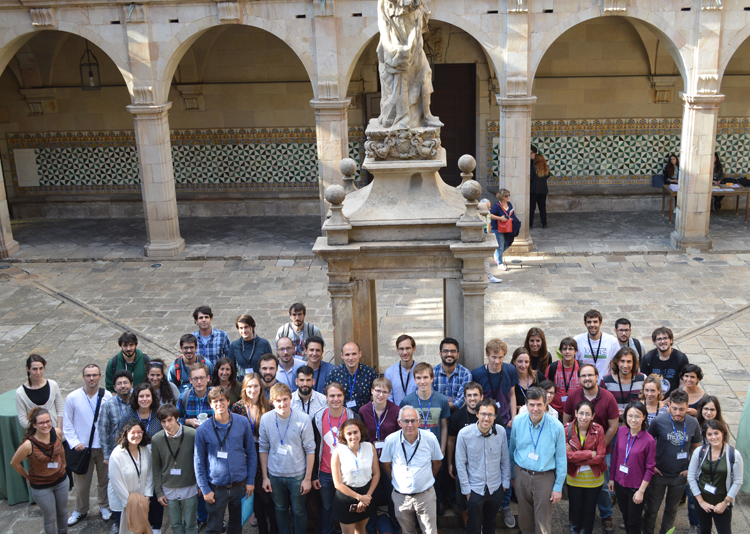
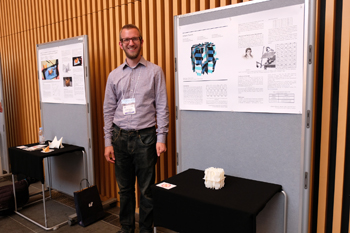 Martin Skrodzki
Martin Skrodzki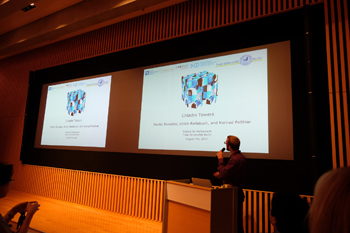 The aim of the ADMC is to encourage the creation of three-dimensional mechanisms and objects in innovative environments via 3D printing technology. The competitors were asked to submit an original design that could be created using a 3D printer. Out of 27 competitors, eleven finalists were invited to present their designs at the 2017 Asian Forum on Graphic Science in Tokyo. Upon announcing “
The aim of the ADMC is to encourage the creation of three-dimensional mechanisms and objects in innovative environments via 3D printing technology. The competitors were asked to submit an original design that could be created using a 3D printer. Out of 27 competitors, eleven finalists were invited to present their designs at the 2017 Asian Forum on Graphic Science in Tokyo. Upon announcing “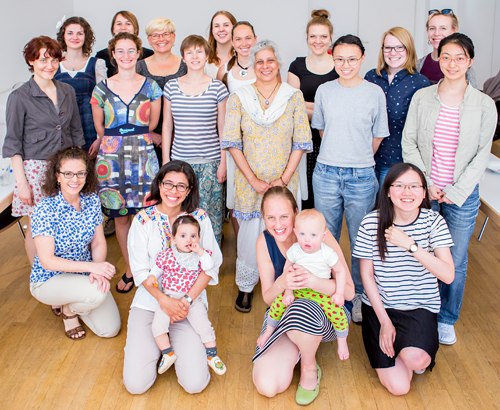 ach semester, the BMS designates one of the
ach semester, the BMS designates one of the 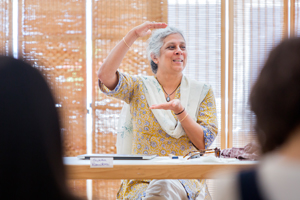 Sujatha is currently a professor of mathematics at the University of British Columbia in Canada.
Sujatha is currently a professor of mathematics at the University of British Columbia in Canada. 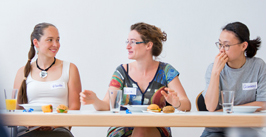 At this informal event, students have the chance to discuss the issues that directly impact female mathematicians and their careers, such as job opportunities, parenthood and work-life balance. Phase I student Yingying, who took part in the Kovalevskaya Lunch for the first time, said that the meeting with Sujatha gave her more motivation to continue doing mathematics and to contribute to the support of women in this field. She added that she was grateful to have been given the chance to meet Sujatha in person.
At this informal event, students have the chance to discuss the issues that directly impact female mathematicians and their careers, such as job opportunities, parenthood and work-life balance. Phase I student Yingying, who took part in the Kovalevskaya Lunch for the first time, said that the meeting with Sujatha gave her more motivation to continue doing mathematics and to contribute to the support of women in this field. She added that she was grateful to have been given the chance to meet Sujatha in person. 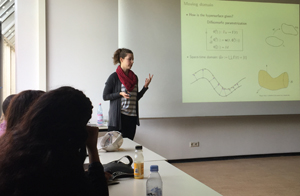
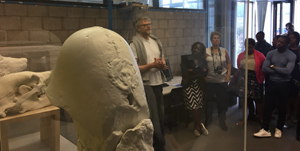 Following the BMS presentations, the delegation then visited the TU Berlin's
Following the BMS presentations, the delegation then visited the TU Berlin's 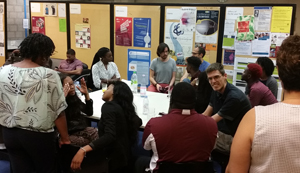 This event was part of the
This event was part of the 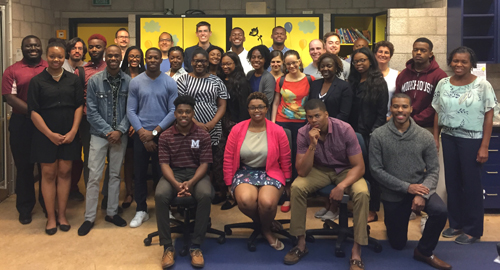
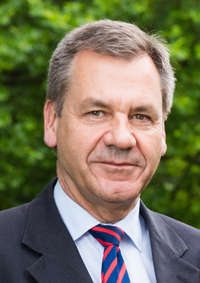 The BMS would like to congratulate
The BMS would like to congratulate 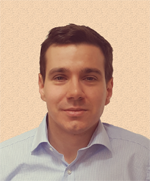
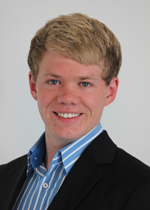
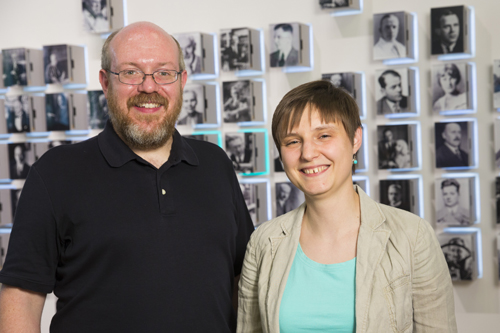
 Robert was awarded the second
Robert was awarded the second  Atul was honoured with a Tiburtius recognition award for his doctoral dissertation entitled "Rough paths, probability and related topics". The theory of rough paths emerges from numerical methods for differential equations and builds a bridge between analysis and stochastics. Atul completed his PhD under the supervision of BMS faculty member
Atul was honoured with a Tiburtius recognition award for his doctoral dissertation entitled "Rough paths, probability and related topics". The theory of rough paths emerges from numerical methods for differential equations and builds a bridge between analysis and stochastics. Atul completed his PhD under the supervision of BMS faculty member 